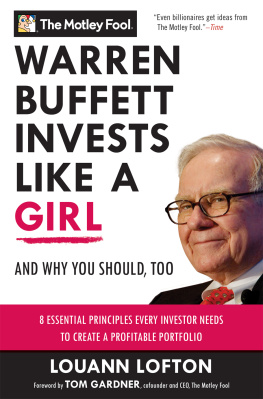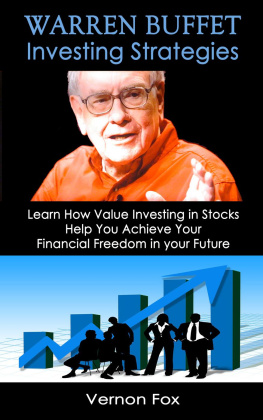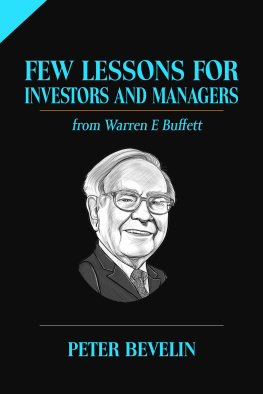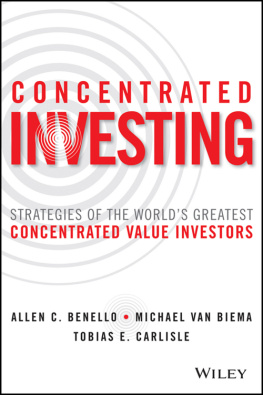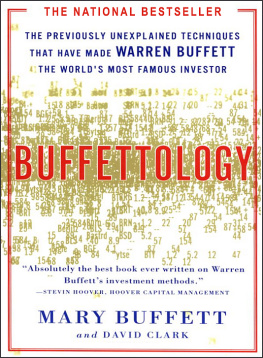
WARREN BUFFETT
INVESTS LIKE A GIRL
AND WHY YOU SHOULD, TOO
LOUANN LOFTON
with a foreword by Tom Gardner

Dedicated to my mother and to the memory of my father
Contents
This is a book for investors about investing. It focuses on the factors that will best determine if you will make or lose money, and whether youll beat the market.
You might naturally assume, then, that youll be reading about how to pick stocksso that you buy GEICO instead of Bank of America. How to evaluate a companys profitabilityso that you invest in Steve Jobs Apple, not Donald Trumps Trump Entertainment Resorts. How to dig deep into a financial statement. How to find the next company poised to rise 10, 20, or 100 times in value.
But, no.
Instead, this book will analyze what will make or break your performance as an investoryour brain, your emotions, your personality. If you harness them, your investment returns will lead you to financial freedom in the Foolish fields of opportunity. But if they harness you, close your eyes because the chili wont stop hitting the fan. Youll sell when you shouldve been buying. Youll believe what you should have doubted. Youll shout while you shouldve been learning. Youll trade when you should always have been investing.
If you want to sustainably make more and more money in the marketusing common stocks or mutual fundsyoull have to learn how to master your temperament. A fine place to start is here, in these pages, as LouAnn Lofton reveals how Warren Buffett parlayed the small investments of a teenager into the largest and greatest investment portfolio in human history.
Its a worthwhile case study!
But up until now, the masters students have looked for his virtuosity mostly in the wrong places. Theyve dreamed in complex variables while trying to unearth Buffetts valuation models. Theyve quizzed the inner circles of his inner circle and, without discretion, have rooted through the most personal material of his life. Theyve spent decades overlooking what matters most but, hey, at least theyve tried!
Over on Wall Street, at the desks of macho traders and salesmen, they ignore Buffett. These guys have done their best to take the Triple Crown: (1) destroying investor portfolios, (2) sinking the balance sheets of their employers, and (3) leveling the world economy. And theyve done it all in the name of big commission-driven bonuses. Their game is not about investing, its about scalping profit while you take all the risk.
If you want to know how to make millions investing in stocks, just do the exact opposite of whats on offer in the high-octane world of Wall Street, where men will be men, right up until they ask taxpayers to bail them out. Turn the page, dear Fool, and you will see what most of the world has overlooked or ignored. Its simple, really: Warren Buffett invests like a girl.
Tom Gardner, December 2010
Chapter 1
Why Temperament Matters Now More Than Ever
September 2008. Britney Spears prepped for a triumphant return to MTVs Video Music Awards, following a lackluster 2007 VMA performance. Cyclist Lance Armstrong announced hed come out of retirement to compete in the next Tour de France. Hurricane Ike had become the fifth hurricane of the Atlantic hurricane season. Delegates at the Republican National Convention named Arizona senator John McCain as their candidate for the November presidential elections. Actor Mickey Rourke was back in the spotlight thanks to the movie The Wrestler , which picked up the award for best film at the Venice Film Festival. Roger Federer won an astonishing fifth consecutive tennis title at the U.S. Open, while Serena Williams picked up her third overall, and first since 2002. British rapper M.I.A. had a hit on her hands with Paper Planes, as did Atlantas own T.I. with Whatever You Like. Fans of NBCs The Office eagerly awaited the premiere of the fifth season to see what kind of hijinks would ensue with Michael Scott and the rest of the Dunder Mifflin team. The defending Super Bowl champion New York Giants beat the Washington Redskins 167 in the NFLs season opener.
Then, less than two weeks into the month, the world changed. Forever.
A financial panic engulfed stock markets, individual investors, and world governments alike. And panic was indeed the perfect word for what happened in the fall of 2008. Writing in the nineteenth century about market panics, Yale professor William Graham Sumner defined one as a wave of emotion, apprehension, alarm. It is more or less irrational. It is superinduced upon a crisis, which is real and inevitable, but it exaggerates, conjures up possibilities, takes away courage and energy.
Wed seen a preview of this madness earlier that same year, as escalating leverage and a slowing housing market crippled debt-rich companies like investment banking firm Bear Stearns, which was forced to sell itself under much duress to JP Morgan (which had the backing and support of the federal government for the purchase) in March 2008 for a bargain price. The housing boom, fueled by subprime borrowing and backed by banks and Wall Street companies looking to cash in on it, began to unravel. And as it did so, it quickly became clear that the credit markets, and the balance sheets of just about every bank and financial firm under the sun and moon, were filled with horrid loads of bad debt. Indeed, it was a real and inevitable crisis.
Bear Stearns demise spooked the market and investors in March. The world then watched as one troubled bank and hedge fund after another revealed that they, too, were suffering under the weight of bad loans, leading us limping into September, when the bankruptcy filing of the storied and debt-laden financial firm Lehman Brothers (the government refused to step in here as they had with Bear to make sure a sale of the firm happened) sent the markets over a cliff. The credit markets, both between businesses and between businesses and individuals, ground to a halt. No one knew who was hiding what in their financial statements. No one knew which balance sheets you could trust, and which you couldnt. It seemed safer to assume the worst, and it seems thats what just about everybody did.
As one famous sage has said, You only learn who has been swimming naked when the tide goes out. In the fall of 2008, Wall Street was a virtual nudist colony. And people, it wasnt pretty, as if I need to remind you.
Stock markets dropped dramatically, leaving investors to hang on for dear life. Volatility was the word of the day, with the so-called fear index reaching new heights as the markets reached new lows. Consumer confidence and investor sentiment plummeted right alongside stock prices. The very future of the economy was uncertain from one minute to the next, with one established financial company after another at a precipice, dangling over the edge, not sure what was ahead.
Hello, panic.
By October 6, 2008, the Dow Jones Industrial Average fell below 10,000 points for the first time since 2004. Three days later, it would drop below 8,600. That same day, October 9, the Standard & Poors 500 index (which tracks 500 of the largest companies in the United States) marked a 42 percent decline over the past year, easily wiping away gains that had taken years to build. This milestone came less than four short, painful weeks after the Lehman Brothers bankruptcy.
It was a time that tested the mettle and tried the nerves of even the most seasoned investor. I watched, wide-eyed and with no small amount of horror, as my portfolio (containing, in some cases, shares of companies Id owned for more than ten years) shrank to just a wisp of itself. How low could it ultimately go? Well-run companies that had nothing to do with the banks or financial institutions troubles were slaughtered right alongside them. You would have thought popular consumer brand and retail companies had suddenly started dabbling in mortgage-backed securities versus selling their soft drinks and leggings.

